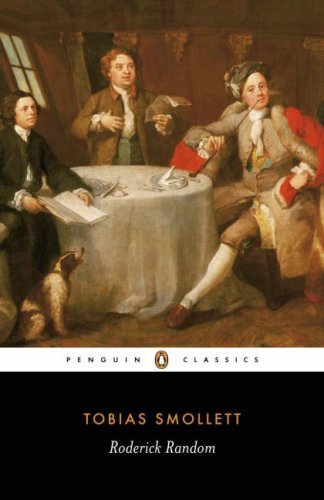What do you think?
Rate this book


476 pages, Paperback
First published January 1, 1748
”’There's a sneaking dog! I always thought him a fellow without a soul, d--n me, a canting scoundrel, who has crept into business by his hypocrisy, and kissing the a--e of every body.’ – ‘Ay, ay,’ says another, ‘one might see with half an eye that the rascal has no honesty in him, by his going so regularly to church.’” (Chapter VII)
”Thus equipped, I put on the gentleman of figure, and, attended by my honest friend, who was contented with the station of my valet, visited the Louvre, examined the gallery of Luxembourg, and appeared at Versailles, where I had the honour of seeing his Most Christian Majesty eat a considerable quantity of olives.” (Chapter XLIV)
”Baffled hitherto in my matrimonial schemes, I began to question my talents for the science of fortune-hunting, and to bend my thoughts towards some employment under the government.” (Chapter LI)
'As they are both utter strangers to life, it is a thousand to one that the girl shall be picked up by some scoundrel or other at Bath, if I don't provide for her otherwise. - You are a well-looking fellow, Random, and can behave as demurely as a quaker.- Now if you will give me an obligation for five hundred pouns, to be paid six months after your marriage, I will put you in a method of carrying her in spite of all opposition.'
This proposal was too advantageous for me to be refused: The writing was immediately drawn and executed; ... (p. 323)
During this unsocial interval, my pride and interest maintained a severe conflict, on the subject of Miss Snapper, whom the one represented as unworthy of my notice, and the other proposed as the object of my whole attention: The advantages and disadvantages attending such a match, were opposed to one another by my imagination; and at length, my judgement gave it so much in favour of the firs,t that I resolved to prosecute my scheme, with all the address in my power. (p. 333)
She's a thousand times more chaste than the mother who bore you; and I will assert her honour with my heart's blood!
We continued a good while as mute as before, till at length the gentleman of the sword, impatient of longer silence, made a second effort, byswearing he had got into a meeting of quakers. “I believe so too,” said a shrill female voice at my left hand, “for the spirit of folly begins to move.” “Out with it then, madam!” replied the soldier. “You seem to have no occasion for a midwife,” cried the lady. “D—mn my blood!” exclaimed the other, “a man can’t talk to a woman, but she immediately thinks of a midwife.” “True sir,” said she, “I long to be delivered.” “What of—a mouse, madam?” said he. “No, Sir,” said she, “of a fool.” “Are you far gone with a fool?” said he. “Little more than two miles,” said she. “By Gad, you’re a wit, madam,” cried the officer, “I wish I could with any justice return the compliment,” said the lady. “Zounds, I have done,” said he. “Your bolt is soon shot, according to the old proverb,” said she. The warrior’s powder was quite spent; the lawyer
advised him to drop the prosecution…